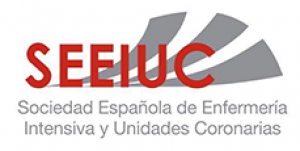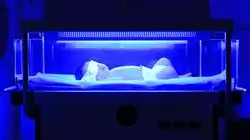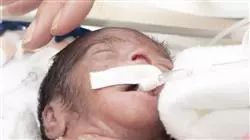University certificate
Scientific endorser

The world's largest faculty of nursing”
Introduction to the Program
With the Postgraduate diploma in Neonatal Critical Care Nursing you have the opportunity to update your knowledge in a practical way but without compromising the maximum scientific rigor, in order to incorporate the latest advances in critical nursing care of the newborn"

Neonatology is a discipline in constant evolution, which is highly dependent on technology and new pharmacological treatments. This context makes the updating of procedures in neonatal critical care, both those performed in the Neonatal ICU and in other care settings outside the ICU (emergency units, primary care centers...), of paramount importance to maintain the provision of care based on the latest scientific evidence and to ensure the safety of the baby.
This program includes the most relevant topics about the organization of a Neonatology Service, as well as admission procedures, the application of neonatal resuscitation techniques if necessary or the approach to the most serious situations in the critical infant, such as cardiac disorders or neonatal shock.
The Postgraduate diploma in Neonatal Critical Care Nursing allows, in a practical way, to achieve this update of the most used procedures to contribute with quality and safety to the recovery of neonates, improve their prognosis and avoid the sequelae of severe pathology.
Improve the care of your newborn patients with the training offered by the Online Postgraduate diploma in Neonatal Critical Care Nursing"
This Online Postgraduate diploma in Neonatal Critical Care Nursing contains the most complete and up to date scientific program on the market. Development of clinical cases presented by experts in the different areas of multidisciplinary knowledge.
- Development of clinical cases presented by experts in the different specialties. The graphic, schematic, and eminently practical contents of which they are composed provide scientific and practical information on the disciplines that are essential for professional practice
- New developments in nursing care of the critically ill newborn patient
- Presentation of practical workshops on procedures, nursing care and diagnosis and treatment techniques
- Algorithm-based interactive learning system for decision-making in the presented clinical situations
- Practical guides on different pathologies. These guides follow the scientific and pedagogical criteria of the main scientific reference societies
- All this will be complemented by theoretical lessons, questions to the expert, debate forums on controversial topics, and individual reflection assignments
- Content that is accessible from any fixed or portable device with an Internet connection
This Postgraduate diploma course may be the best investment you can make in the selection of a refresher program for two reasons: in addition to updating your knowledge in neonatology, you will obtain a Postgraduate diploma from TECH Global University"
Its teaching staff includes renowned specialists in the field of neonatology, who bring the experience of their work in the country’s leading medical centres to this training.
The multimedia content developed with the latest educational technology will provide the professional with situated and contextual learning, i.e., a simulated environment that will provide an immersive training program to train in real situations.
This program is designed around Problem Based Learning, whereby the nursing professional must try to solve various typical professional practice situations that arise during the course. In order to do this, the nursing professional will be assisted by an innovative interactive video system, created by renowned and experienced experts in treating critical neonatal patients and with extensive teaching experience.
Increase your career opportunities by taking the Postgraduate diploma in Neonatal Critical Care Nursing"

It includes real clinical cases to bring the development of the program as close as possible to everyday practice"
Why study at TECH?
TECH is the world’s largest online university. With an impressive catalog of more than 14,000 university programs available in 11 languages, it is positioned as a leader in employability, with a 99% job placement rate. In addition, it relies on an enormous faculty of more than 6,000 professors of the highest international renown.

Study at the world's largest online university and guarantee your professional success. The future starts at TECH”
The world’s best online university according to FORBES
The prestigious Forbes magazine, specialized in business and finance, has highlighted TECH as “the world's best online university” This is what they have recently stated in an article in their digital edition in which they echo the success story of this institution, “thanks to the academic offer it provides, the selection of its teaching staff, and an innovative learning method aimed at educating the professionals of the future”
A revolutionary study method, a cutting-edge faculty and a practical focus: the key to TECH's success.
The most complete study plans on the university scene
TECH offers the most complete study plans on the university scene, with syllabuses that cover fundamental concepts and, at the same time, the main scientific advances in their specific scientific areas. In addition, these programs are continuously being updated to guarantee students the academic vanguard and the most in-demand professional skills. In this way, the university's qualifications provide its graduates with a significant advantage to propel their careers to success.
TECH offers the most comprehensive and intensive study plans on the current university scene.
A world-class teaching staff
TECH's teaching staff is made up of more than 6,000 professors with the highest international recognition. Professors, researchers and top executives of multinational companies, including Isaiah Covington, performance coach of the Boston Celtics; Magda Romanska, principal investigator at Harvard MetaLAB; Ignacio Wistumba, chairman of the department of translational molecular pathology at MD Anderson Cancer Center; and D.W. Pine, creative director of TIME magazine, among others.
Internationally renowned experts, specialized in different branches of Health, Technology, Communication and Business, form part of the TECH faculty.
A unique learning method
TECH is the first university to use Relearning in all its programs. It is the best online learning methodology, accredited with international teaching quality certifications, provided by prestigious educational agencies. In addition, this disruptive educational model is complemented with the “Case Method”, thereby setting up a unique online teaching strategy. Innovative teaching resources are also implemented, including detailed videos, infographics and interactive summaries.
TECH combines Relearning and the Case Method in all its university programs to guarantee excellent theoretical and practical learning, studying whenever and wherever you want.
The world's largest online university
TECH is the world’s largest online university. We are the largest educational institution, with the best and widest online educational catalog, one hundred percent online and covering the vast majority of areas of knowledge. We offer a large selection of our own degrees and accredited online undergraduate and postgraduate degrees. In total, more than 14,000 university degrees, in eleven different languages, make us the largest educational largest in the world.
TECH has the world's most extensive catalog of academic and official programs, available in more than 11 languages.
Google Premier Partner
The American technology giant has awarded TECH the Google Google Premier Partner badge. This award, which is only available to 3% of the world's companies, highlights the efficient, flexible and tailored experience that this university provides to students. The recognition as a Google Premier Partner not only accredits the maximum rigor, performance and investment in TECH's digital infrastructures, but also places this university as one of the world's leading technology companies.
Google has positioned TECH in the top 3% of the world's most important technology companies by awarding it its Google Premier Partner badge.
The official online university of the NBA
TECH is the official online university of the NBA. Thanks to our agreement with the biggest league in basketball, we offer our students exclusive university programs, as well as a wide variety of educational resources focused on the business of the league and other areas of the sports industry. Each program is made up of a uniquely designed syllabus and features exceptional guest hosts: professionals with a distinguished sports background who will offer their expertise on the most relevant topics.
TECH has been selected by the NBA, the world's top basketball league, as its official online university.
The top-rated university by its students
Students have positioned TECH as the world's top-rated university on the main review websites, with a highest rating of 4.9 out of 5, obtained from more than 1,000 reviews. These results consolidate TECH as the benchmark university institution at an international level, reflecting the excellence and positive impact of its educational model.” reflecting the excellence and positive impact of its educational model.”
TECH is the world’s top-rated university by its students.
Leaders in employability
TECH has managed to become the leading university in employability. 99% of its students obtain jobs in the academic field they have studied, within one year of completing any of the university's programs. A similar number achieve immediate career enhancement. All this thanks to a study methodology that bases its effectiveness on the acquisition of practical skills, which are absolutely necessary for professional development.
99% of TECH graduates find a job within a year of completing their studies.
Postgraduate Diploma in Neonatal Critical Care for Nursing
Neonatal critical care is advanced, specialized care provided to newborns who require intensive medical attention due to underlying health complications. Neonatal critical care nurses are highly trained professionals who work in neonatal units or neonatal intensive care units (NICUs) in hospitals.
These nurses are trained to provide specialized care and attention to newborns with a wide range of health and medical problems, from extremely small or sick premature babies to babies requiring surgery or other intensive treatments.
During the development of neonatal critical care for nursing, professionals learn to develop specific medical skills and techniques for newborn care, including medication administration, mechanical ventilation, care of lines and catheters, and other specialized procedures.
In addition to specialized medical knowledge, neonatal critical care nurses must be Postgraduate Diplomas in the care and attention of the newborn, which means that they must possess skills in positive interaction, in communication with parents and relatives, and in creating a comfortable and safe environment for patients.
In the neonatal critical care setting, nurses can work collaboratively with other health professionals, such as pediatricians, physical therapists, occupational therapists, and nutritionists, to best assess and treat babies .
The work of nurses in neonatal critical care is essential to ensure the safety and recovery of sick babies. Nurses must be aware of changes in the newborn's health status and adjust their care and treatment according to the individual needs of each baby.
Neonatal critical care nursing refers to specialized and advanced care offered to newborns who require intensive medical care. During their preparation, professionals must learn specific medical and technical skills and also develop skills in the care and attention of the newborn. Neonatal critical care nurses collaborate with other healthcare professionals to ensure the safety and recovery of sick babies.







